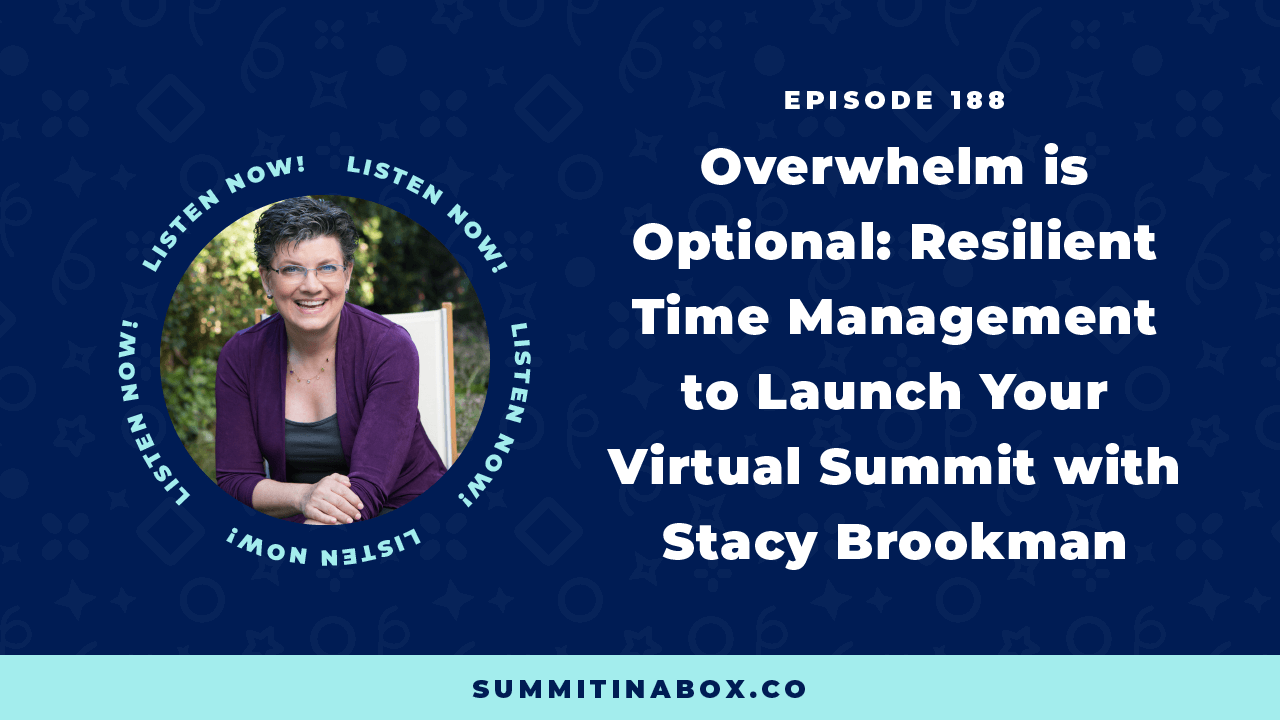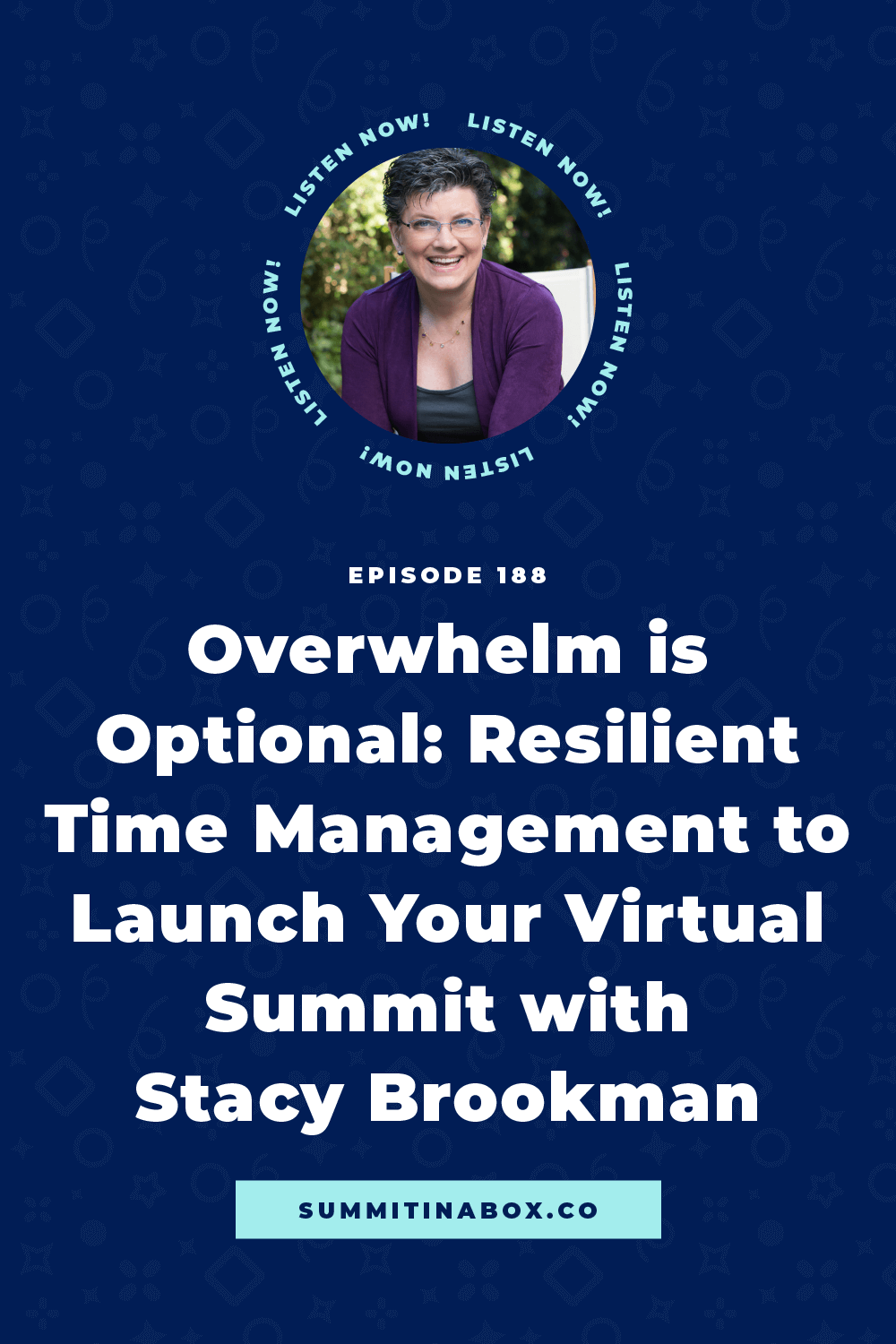Overwhelm is Optional: Resilient Time Management to Launch Your Virtual Summit with Stacy Brookman


Hosting a virtual summit is a big project that takes a good amount of time and attention. Especially when hosting your first summit, it's not uncommon to end up feeling overwhelmed as you go through a brand new experience and do something you haven't done before.
But overwhelm doesn't have to be part of the summit planning process. Today, I have a special guest, Stacy Brookman, who believes that overwhelm is optional and that it's possible to manage your time in a way that prevents overwhelm and allows you to feel on top of things as you prepare for your summit.
She's here to share how you can use resilient time management to launch your virtual summit and how you can *choose* to avoid overwhelm!
Stacy has so much great insight to share, and during this conversation I felt both called out and freed. This is one you won't want to miss. I'll let Stacy take it from here!
Real Life Resilience
I love to coach people on how to have and set resilient boundaries for themselves. One of the things I always tell my clients is that, "boundaries are for us, not for other people". I learned this for myself for the first time after starting a side business during the last 5 years of my 29 year corporate career. At one point, I realized that it was hard to do both, especially without good boundaries, and something needed to change.
So, I stopped working through lunch and I started actually taking my lunch break and setting that boundary around my work day so I'd have time to work on my business. I’d go into one of our quiet rooms and record podcasts, write blog posts, and take the time that I needed...and then I started to leave work on time.
I took my time to do things for my business.
Juggling All The Things
I've hosted two summits, both while working my corporate job, running my own business, and then working on my summit to grow my business. It was a lot to juggle, and I knew it would be overwhelming to try to figure out my summit all on my own, which is why I bought Summit in a Box®.
In addition to my busy work schedule, I also had 2 teenage daughters at home, moved to a new house, and got married all during the time I was planning my summit. It was a lot!
Managing my time helped me keep up with it all.
I knew that hosting a summit with everything else I had on my plate would be a challenge, so I started planning well in advance and acknowledged that I can only do what I can do, and I would have to let that be enough. I also knew that managing my time was the best thing I could do for myself.
I know time management is a bit of a dry topic. It can seem so boring, and it's easy to dismiss a lot of time management tricks or hacks that we've heard so many times before. You have to actually take the time to make it your own process and implement it well in order to make time management work as well as it can for you.
When I started taking my time management seriously, and developed my resilient time management practice, I realized that I could grow my business and host a summit along with my full time job, without having to work until midnight to make it happen. Once I learned the process and became diligent about using it, I was able to do more than I ever imagined.
What is resilient time management?
Resilient time management doesn't mean just blocking your time. It means being very intentional about following your time management systems and making it work for you.
The first time you try to manage your time, you’re going to have brain resistance. Our brains always resist anything new that we try to do, so it's normal that you'll experience resistance when you try out a new time management system. Resilient time management means being deliberate and prioritizing your system despite the resistance because your future self will thank you.
As we become business owners, especially if you're used to working for someone else, it's normal to look for someone else to solve our problems, but we need to learn to look inside. It's normal to experience new situations in your business, and your first thought might be, "I don't know how to do this." But you can find the answer inside yourself.
For example… I knew I wanted to go live on LinkedIn as part of a project I'm planning in my business, but I was having a hard time finding good instructions for how to do it, and ended up going down a long rabbit hole telling myself it was too complicated and I couldn't do it. But then I was able to tap into my resilience instead of my resistance, and I decided, "I’m going to figure this out, and I'm doing this."
This opened up new ways of thinking, and finally allowed me to move forward with a plan that would work for me. This is what resiliency can do for you. It allows you to own the problem, without expecting anyone else to come to your rescue, because you come to your own rescue.
Set Resilient Boundaries
In order to have resilient time management, you have to have resilient boundaries. To me, resilient boundaries mean having your own back. Boundaries aren't about having rules about what other people can or can't do. You often have to set boundaries for yourself about how you'll respond to others actions, but it's not about controlling them.
Resilient boundaries = If this happens, I’m going to do this.
With time management, it's not necessarily about having boundaries with other people, but about having boundaries with yourself.
For example… If I say I’m going to write a blog post in 30 minutes, I'm going to write a blog post in that 30 minutes. Not research this or that and check email, and before you know it 30 minutes are over, and you haven’t written a single word.
But if it’s in your time block, you get it done…even if it’s "B-" work, and not the best blog post ever written. That’s okay! If you want to give yourself an hour instead of 30 minutes next time to write a better blog post, you can do that. Resilient boundaries and resilient time management say, “It’s on my calendar, it’s in my schedule, so I’m going to do it in that amount of time and let that be enough.”
Resiliency and Summit Planning
Resilient time management helped me manage my time while planning my summit, and it can help you too!
There are steps to follow in order to manage your time resiliently. The first is to brain dump all the things you need to get done for the week… personally, professionally, in your business, for planning your summit everything. I usually spend about 15-20 minutes doing this brain dump at the beginning of the week, but when I first started, it took an hour!
Next, order everything from most important to least important. When you do that, you take a look at your calendar and block off personal time first. You don't want to ever sacrifice family or yourself. It's just not worth it.
Then, I recommend looking at your calendar and setting aside 2-hour "Focus Time" blocks to do your focused work. I do 2 Focus Time blocks per week, but if you're just starting out with this, try doing a 2--hour Focus Time block every day.
Once you've scheduled your Focus Time blocks, go back to your list of tasks move them onto your calendar, according to their priority, in blocks of time you feel it will take to get them done.
Don’t forget to include some buffer time for driving your kids to school or doing the research before you can write your blog post. Add that buffer time in.
If you’re new to using time blocks, add flex time for 30 minutes at the end of every day in case something comes up.
When you set aside that time and commit to your time blocks, you’ll knock out your tasks like you never imagined.
It’s easy when you’re planning a new summit to get into your head about it and put it off because you feel like you don’t know what to do or where to go next. You end up checking social media or emails and never getting any summit tasks checked off.
But when you have these chunks of time in your calendar, and you're clear on what your priority tasks are that are most important to complete, you'll sit down and do it because you've committed to it. That's resilient time management.
Hosting a summit is a big project and it does require dedicated time, but that doesn't mean working until midnight, skipping dinner, eat at your desk, or missing out on time with your family. If you are efficient with your time, you can absolutely have time for your family, have another job, have your business, and still host a virtual summit.
Overwhelm is Optional
Whether it’s a summit, your business in general, your family, or other projects, overwhelm is optional. When you take the time to plan and be deliberate, you find a way to make it work for you. You can combat overwhelm by being deliberate and having resilient time management.




